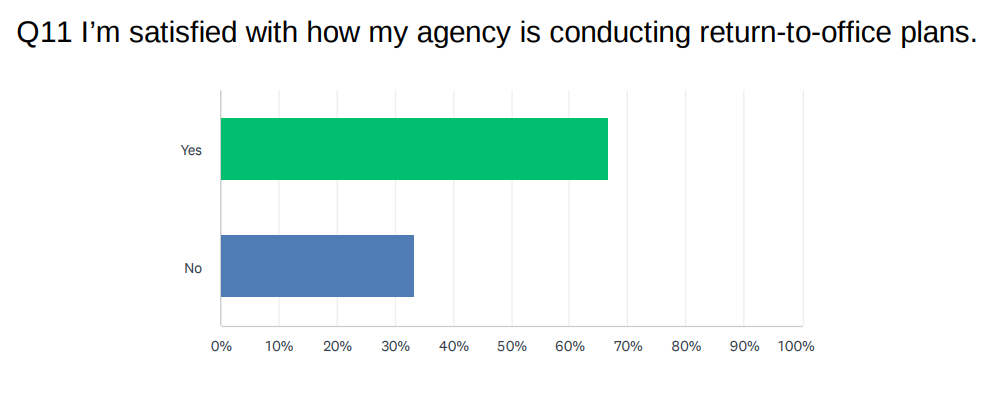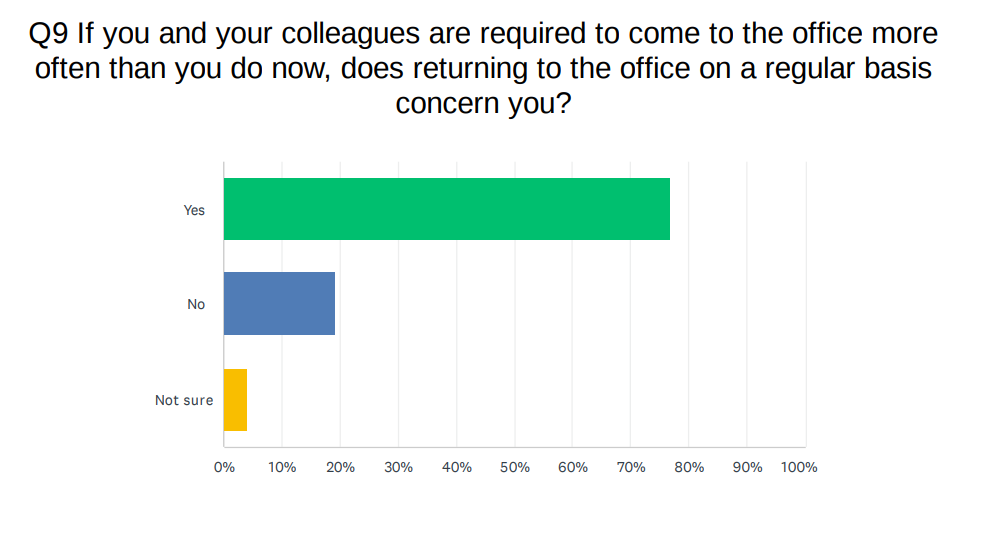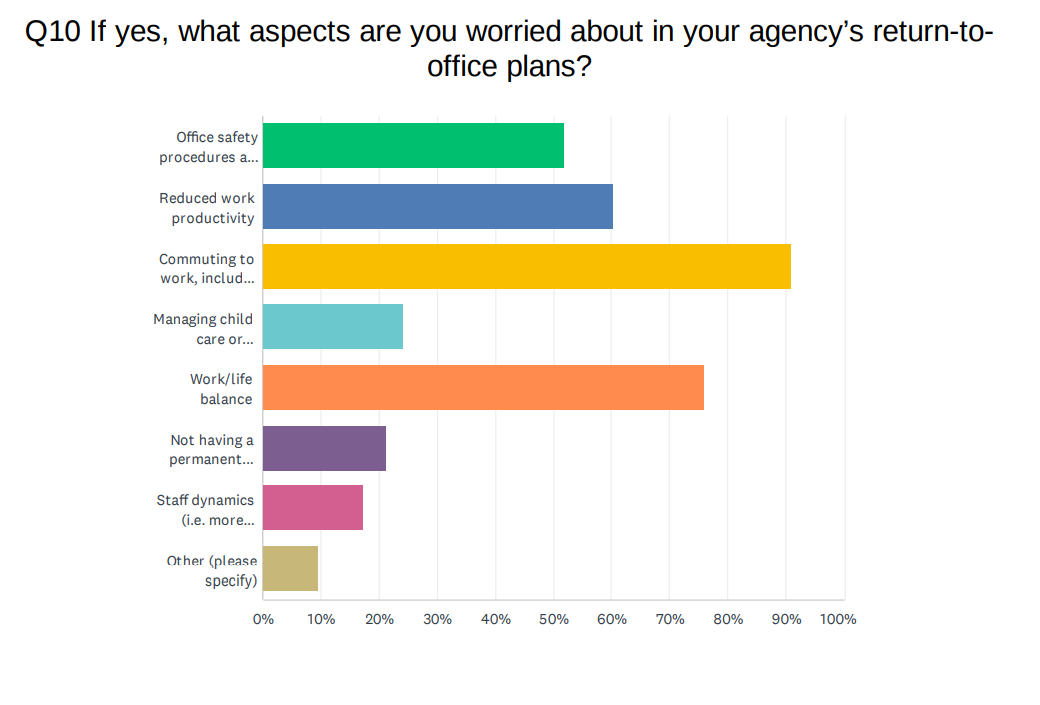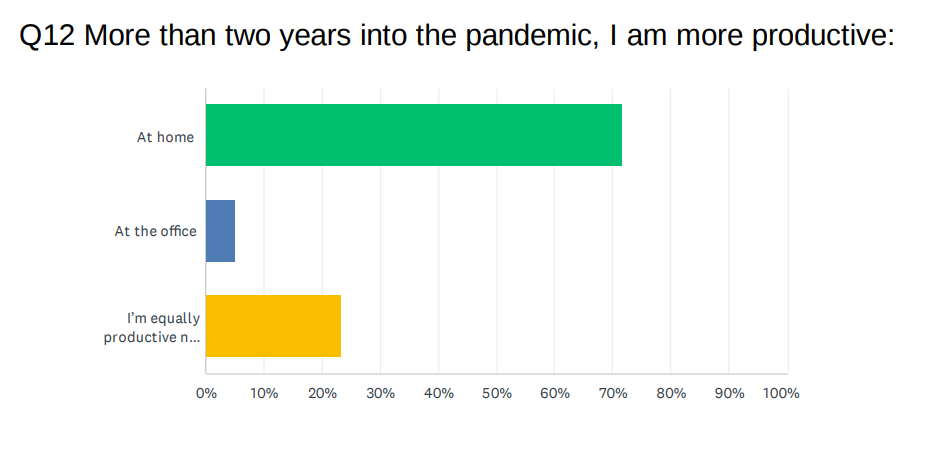Exclusive
Survey: As agencies turn to hybrid work, many feds want more remote options
About 64% of FNN survey respondents said they were satisfied with their current work situation, but at the same time, the requirement of working in the office at...
Best listening experience is on Chrome, Firefox or Safari. Subscribe to Federal Drive’s daily audio interviews on Apple Podcasts or PodcastOne.
As agencies pivot their thinking about the role of hybrid work — a mix of in-person and telework opportunities — for the federal workforce, some federal employees are raising questions about the reasons behind working in the office at all.
Close to two-thirds — about 64% — of respondents in an exclusive Federal News Network online survey said they were satisfied with their current work situation. But at the same time, the requirement of working in the office at least once a week was a pain point for some.
“We’ve been fully remote for over two years. The hybrid is a very difficult adjustment. The mission has been accomplished with no interruption, so why the requirement to be in the office?” one respondent wrote.
Many said they didn’t understand the rationale behind coming to the office just one day per week, and that they would prefer to telework every day. And some who were unsatisfied with their work situation said they would have preferred more telework flexibility.
“All of my work can be done remotely. There is no need to come to the office to work. My supervisor just likes to have a presence in the office building,” another respondent wrote.
These are just a handful of results from Federal News Network’s exclusive survey that asked respondents about their agencies’ return-to-office plans. FNN received 1,151 survey responses, with about 72% working in a civilian agency, 18% working in the Defense Department and the rest working either in the Intelligence community or for a federal contractor. FNN disqualified responses from those who identified themselves as retired.
According to the survey, about 60% of federal employees currently work in a hybrid environment, 33% work entirely remotely, and the rest said they work entirely in person. Those who work in a hybrid environment are typically teleworking four days per week and going into the office one day per week.
Although a majority of respondents said they preferred working at home, a positive office culture is a challenge that agencies are grappling with. Some survey respondents said the casual conversations and in-person interactions they get in the office are difficult, if not impossible, to replicate remotely.
“There are significant adjustment issues to work out, even still,” one respondent wrote. “Lots of informal communication mechanisms that helped with office culture and work going more smoothly do not exist in a hybrid or remote environment yet.”
Still others argued that maximum telework created a disconnect among coworkers. It’s a common challenge for agencies to figure out how to better engage and connect with employees working in different physical locations.
“Employees hide behind screens, there is not any way to experience facial expressions [or] non-verbal body language. Being in the office allows for quicker building of work relationships and provides support for camaraderie and better communication,” one respondent wrote.
Regardless of if federal employees were happy with in-office or remote work, one thing remained consistent — hybrid work has become all the more popular for agencies.
“At this point, more than half of our folks are teleworking or are remote. The office doesn’t look like it used to and it won’t. We have to embrace something different, even if we don’t know what it looks like or how it will work,” one respondent wrote.

This survey is not the first time FNN collected responses on how feds feel about agencies’ telework opportunities. Out of roughly 3,000 respondents from a May survey, about half told FNN that they were dissatisfied with their agencies’ return-to-office plans.
The reasons that current survey respondents actually felt satisfied with the return-to-office plans varied greatly.
“I think most everyone should be back at work – I never left. People have taken advantage and it is not equitable to those unable to telework,” one respondent wrote.
“Full remote work should be a more acceptable option,” another wrote.
The in-person versus telework setting also often tied to an employee’s likeliness to stay in a job.
“Most will seek employment where telework/remote work is offered. This option has been life-changing for many in a positive way,” one survey respondent wrote.
Despite how they felt about in-office versus telework, many respondents said their agency was generally communicating well about any upcoming changes in the telework policy.
“I was given clear dates and a specific outline of how things would change, as well as assistance from my supervisors in transitioning back,” one respondent wrote.
Hybrid work availability is a growing trend in the federal workforce, and something that agencies with more limited remote work options may struggle with. Some agencies, such as the Social Security Administration, are struggling with workforce retention — in part because of a lack of telework flexibilities.
Many survey respondents also said they were concerned with the potential of coming into the office more often than they do now, showing that telework remains a strong preference for federal employees. In fact, a strong portion of survey respondents said they would look elsewhere if they were asked to come back to the office more often.
“[If I was required to come to the office more often than I do now], I would go to another agency that supported full-time telework. Yes, I would leave,” one respondent wrote.

It’s a common theme for federal employees — in a set of governmentwide pulse surveys, for example, many respondents also said they would take a job elsewhere if it offered more workplace flexibilities and remote work options.
The debate over telework remains top of mind for virtually every agency. Many Republican lawmakers have also said that telework and remote work impede productivity. They said working from home during the height of the COVID-19 pandemic caused work backlogs to build at several agencies, including the IRS, Social Security Administration and the State Department. But OPM Director Kiran Ahuja has said that telework could help agencies recruit employees to fill specific skill gaps, including a demand for cybersecurity experts.
From the employees’ perspective, many factors involved in in-office work, like commuting, health and safety, and the potential for burnout, were all causes for concern for some survey respondents.
Similar to FNN’s previous survey, commuting to work remained the top reason that federal employees prefer working from home — with work-life balance, work productivity and COVID-19 safety protocols all not far behind.

“It greatly impacts work-life balance. When allowed to work at home, I start earlier, am more engaged and less stressed. I don’t have interruptions and don’t have to deal with a commute or office politics,” one respondent wrote.
“I still get heartburn from the traffic,” another wrote.
Some also said the approaching flu and cold season caused concern about employees’ health and wellbeing, and said they preferred to work from home to avoid contracting illnesses, not least of which being the spread of COVID-19.
Beyond the reasons some respondents felt concerned, a majority of respondents said they simply felt more productive working from home.
“The day I am in the office I am about 50% less productive,” one respondent wrote. “I have to close my door to get anything done, which defeats the purpose of being in the office.”

The FNN survey also came just as OPM released the results of the 2022 Federal Employee Viewpoint Survey (FEVS). Although employee engagement remained at the same level as it was in 2021, many federal employees reported in the newest iteration of FEVS that they were returning to the office more frequently. Across all agencies, 14% of employees have remote work arrangements, while 25% telework three days or more per week. That’s a decrease from 2021 FEVS results, which showed 36% of respondents teleworking every day. In 2020, 47% of feds said they were teleworking daily.
Overall, some respondents said agencies should have listened more to employees when making changes to their return-to-office policies. Others said more telework and remote work flexibilities are essential to employee retention.
“If they don’t change the policy, our agency will continue to lose long term employees,” one respondent wrote. “We’ve already started to lose people to remote jobs.”
Copyright © 2024 Federal News Network. All rights reserved. This website is not intended for users located within the European Economic Area.
Drew Friedman is a workforce, pay and benefits reporter for Federal News Network.
Follow @dfriedmanWFED
Related Stories

OPM says federal employees ‘agency-hopping’ to telework-friendly offices




